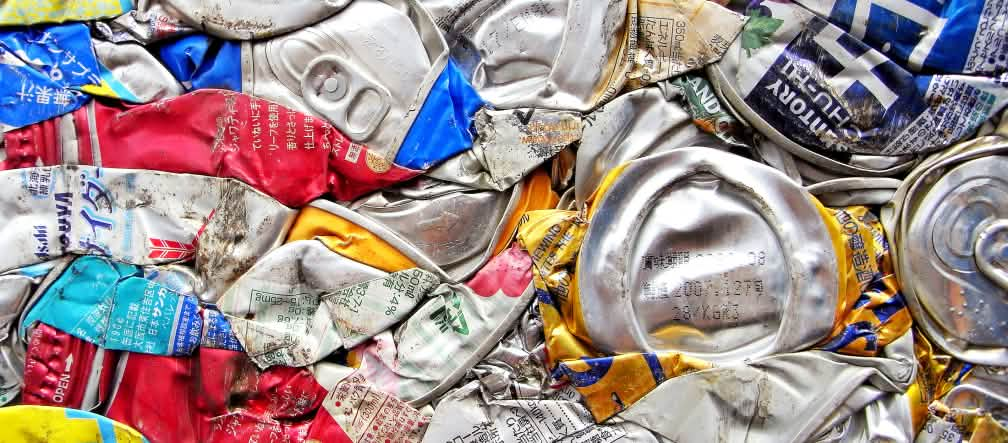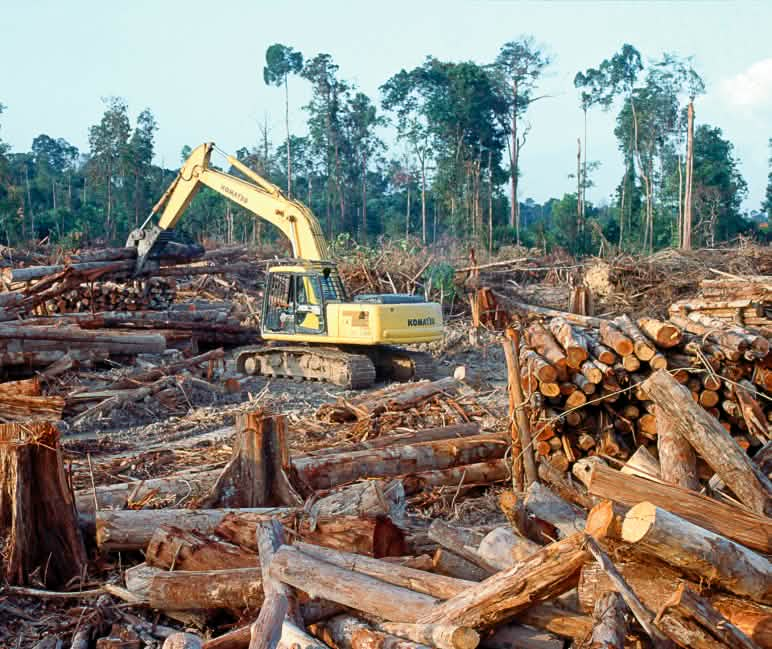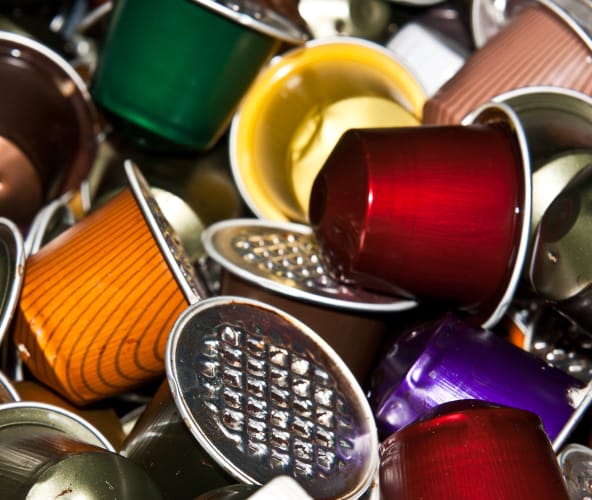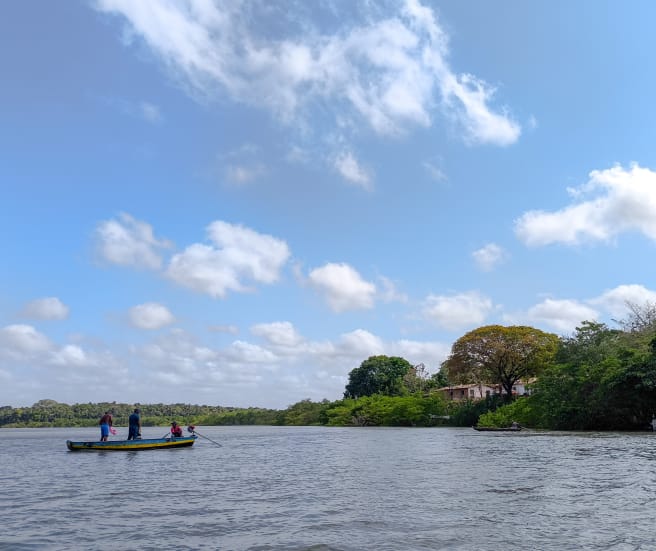
Aluminum
Aluminum is a ubiquitous material that promises ease and convenience. But the extraction of its raw material, bauxite, and its processing into aluminum destroy vast tracts of old-growth forest. The energy-intensive production of aluminum typically relies on powerful hydroelectric dams that often flood the lands of Indigenous communities. Red mud, a toxic waste product of aluminum refining, is a serious environmental hazard.
Five-minute info: Aluminum
Definition: What is aluminum?

Aluminum is the third most abundant chemical element (symbol AL) and the most abundant metal in the Earth’s crust, where it occurs in the form of oxides and aluminum silicates. The metal aluminum is refined from bauxite. The main producing countries and their respective shares of world production are Australia (29%), China (19%), Guinea (18%), Brazil (10%), India (7%), Jamaica (3%) and Indonesia (3%) (GIZ - BGR 4-2021). In Europe, Greece is the only country with significant bauxite deposits.
The silvery-white metal is particularly light and highly malleable. Aluminum alloys are very strong. The metal reacts with air and water to form a thin oxide layer that protects it from further corrosion.
What is aluminum used for?

In Germany, for example, the automotive industry is the largest consumer, accounting for 47% of the aluminum used in 2019. Other uses of aluminum include construction (14%) and packaging (12%). Electrical engineering and mechanical engineering follow with 7% each, the iron and steel industry with 5%, while the use in household goods, office equipment, furniture and leisure products accounts for 8% (source: German Federal Institute for Geosciences and Natural Resources (BGR), Nov. 2020: Deutschland ‒ Rohstoffsituation 2019).
Conventional cars manufactured in Europe contain an average of 180 kg of the light metal. Much more aluminum is used for SUVs and luxury cars – especially by Jaguar, Land Rover and Porsche – as well as in electric vehicles. The Audi E-Tron contains no less than 800 kg of aluminum (source: European Aluminium 2019: Aluminum Content in European Passenger Cars).
Many disposable products such as coffee pods, soda cans and yogurt lids are made from aluminum. Aluminum salts are also used in antiperspirants and medicines and to regulate the consistency of creams.
Demand for aluminum has skyrocketed in recent years, with devastating consequences.
What is the environmental impact of aluminum?
Although aluminum is the most abundant metal in the Earth’s crust, it is only found in a bonded form. Mining, processing and refining bauxite into raw aluminum is energy-intensive and has a significant environmental impact. Recycling aluminum, on the other hand, uses only 5% of the energy required to extract raw aluminum from ore.
- Rainforest destruction for bauxite mining
Much of the world’s bauxite is found in the tropics. In Australia, Indonesia, Brazil and Guinea, large areas of forest are cleared and soil removed to access the thin layer of rock below the Earth’s surface. In Porto Trombetas, Brazil, an area the size of 250 soccer fields is cleared each year for bauxite mining. - Toxic waste
Aluminum is extracted from bauxite through a complex chemical process. The production of one ton of raw aluminum produces up to four tons of toxic waste, which has a distinctive red color due to the iron-rich compounds it contains. This so-called red mud is stored in huge, open tailings ponds. Leaks and dam breaks are common, often burying entire villages under the highly corrosive sludge. Toxic heavy metals such as lead, cadmium and mercury turn living rivers into toxic dead zones. Even without major accidents, environmental toxins are released into the air, soil and water: People living near mines and aluminum plants complain of contaminated drinking water, skin diseases, and fish die-offs. - High energy consumption in refining
It takes 15 MWh of electricity to produce one ton of aluminum – enough to power a two-person household for five years. Because of its energy-intensive nature, aluminum production is only economically viable if a lot of very cheap electricity is available. To this end, huge hydroelectric dams have been built in Brazil and elsewhere, flooding the rainforest and the land of Indigenous communities.
The negative effects of aluminum are not only felt in the producing countries. Aluminum in everyday products is a health hazard: Salts released from aluminum foil, as well as the aluminum components in deodorants and medicines, can accumulate in our bodies and are suspected of causing cancer and Alzheimer’s disease.
And what can we do about it?
Aluminum is everywhere in our daily lives. Between 2009 and 2016, production increased by nearly 60% to 58.3 million metric tons per year – not least for everyday products. And this is where there is great potential savings.
- Think twice about packaging: Takeout meals in aluminum trays, granola bars in multilayer wrappers – snacks are often packaged in aluminum. It just takes a little planning to prepare snacks at home for school or the office. You can dramatically reduce packaging waste by using sandwich boxes instead of aluminum foil and reusable bottles for beverages (such as home-made iced tea) instead of soda cans.
- Avoid coffee pod waste: One kilogram of coffee in pods can cost up to EUR 80 (USD 95 or GBP 70), making it hard on your wallet and the environment. It takes up to three grams of packaging to deliver six to seven grams of coffee. French presses and stainless steel stovetop espresso makers are economical and environmentally friendly alternatives.
- Get the most life out of aluminum products: Aluminum can be found in many household items such as computer cases, aluminum shelving and carpet strips. Investing in high-quality products and using them as long as possible can reduce your aluminum footprint.
- Recycle aluminum: It’s not always possible to avoid aluminum packaging altogether. However, the raw materials in such packaging can theoretically be reused indefinitely – as long as we dispose of it with care to ensure it is recycled.
- Hit the road without hundreds of kilos of aluminum: The up to 150 kilograms of aluminum in a new car is a pretty good argument for biking or taking public transportation.
- Avoid aluminum for your health: Aluminum-free natural cosmetics and deodorants without aluminum salts (e.g. soda-based) are a healthy choice. Pharmacists can often recommend alternatives to medications containing aluminum such as antacids. Do not store acidic foods in aluminum foil: harmful aluminum salts can leach into the food.
- Share and spread the word: Very few people are aware of the link between coffee pods and rainforest destruction. Please share this information widely to raise awareness of the dangers of aluminum. If demand for aluminum products drops, companies can be persuaded to change their ways. Online petitions are also a powerful tool for change.

Aluminum is the third most common chemical element in the earth’s crust. Bauxite, the ore used to make aluminum, is generally extracted in open-pit mines.

Aluminum: Here are links (videos, articles, studies) to our aluminum resources and more information for a deeper dive into the subject.
Your signature can make a real difference. Our petitions expose destructive projects and name the perpetrators. Together we can have an even greater impact!


